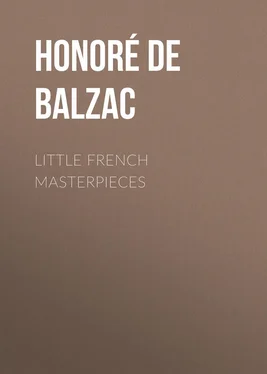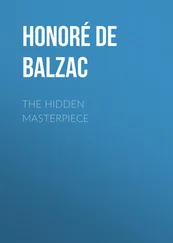Honoré Balzac - Little French Masterpieces
Здесь есть возможность читать онлайн «Honoré Balzac - Little French Masterpieces» — ознакомительный отрывок электронной книги совершенно бесплатно, а после прочтения отрывка купить полную версию. В некоторых случаях можно слушать аудио, скачать через торрент в формате fb2 и присутствует краткое содержание. Жанр: foreign_antique, foreign_prose, на английском языке. Описание произведения, (предисловие) а так же отзывы посетителей доступны на портале библиотеки ЛибКат.
- Название:Little French Masterpieces
- Автор:
- Жанр:
- Год:неизвестен
- ISBN:нет данных
- Рейтинг книги:5 / 5. Голосов: 1
-
Избранное:Добавить в избранное
- Отзывы:
-
Ваша оценка:
- 100
- 1
- 2
- 3
- 4
- 5
Little French Masterpieces: краткое содержание, описание и аннотация
Предлагаем к чтению аннотацию, описание, краткое содержание или предисловие (зависит от того, что написал сам автор книги «Little French Masterpieces»). Если вы не нашли необходимую информацию о книге — напишите в комментариях, мы постараемся отыскать её.
Little French Masterpieces — читать онлайн ознакомительный отрывок
Ниже представлен текст книги, разбитый по страницам. Система сохранения места последней прочитанной страницы, позволяет с удобством читать онлайн бесплатно книгу «Little French Masterpieces», без необходимости каждый раз заново искать на чём Вы остановились. Поставьте закладку, и сможете в любой момент перейти на страницу, на которой закончили чтение.
Интервал:
Закладка:
Porbus went to fetch palette and brushes. The little old man turned up his sleeves with a convulsive movement, passed his thumb over the palette laden with colours, which Porbus handed to him, and snatched rather than took from his hands a handful of brushes of all sizes; his pointed beard twitched with the mighty efforts that denoted the concupiscence of an amorous imagination. As he dipped his brush in the paint, he grumbled between his teeth:
"These colours are good for nothing but to throw out of the window, with the man who made them! They are disgustingly crude and false! How can one paint with such things?"
Then, with feverish vivacity, he dipped the point of the brush in different mounds of colour, sometimes running through the entire scale more rapidly than a cathedral organist runs over his keyboard in playing the O Filii at Easter.
Porbus and Poussin stood like statues, each on one side of the canvas, absorbed in the most intense contemplation.
"You see, young man," said the old man, without turning – "you see how, by means of three or four touches and a little blue varnish, one can make the air circulate around the head of the poor saint, who surely must be stifling and feel imprisoned in that dense atmosphere! See how that drapery flutters about now, and how readily one can realise that the wind is raising it! Formerly it looked like starched linen held in place by pins. Do you see how perfectly the satinlike gloss with which I have touched the breast represents the supple plumpness of a maiden's flesh, and how the mixture of reddish brown and ochre warms the gray coldness of that tall ghost, in which the blood congealed instead of flowing? Young man, young man, what I am showing you now, no master could teach you! Mabuse alone possessed the secret of imparting life to figures. Mabuse had but one pupil, and that was I. I have had none, and I am growing old! You have intelligence enough to guess the rest from this glimpse that I give you."
While he spoke, the strange old man touched all the parts of the picture: here two strokes of the brush and there only one; but always so opportunely that one would have said that it was a new painting, but a painting drenched with light. He worked with such impassioned zeal that the perspiration stood upon his high forehead; he moved so swiftly, with such impatient, jerky little movements, that to young Poussin it seemed as if there must be in that strange man's body a demon acting through his hands and guiding them erratically, against his will. The superhuman gleam of his eyes, the convulsions which seemed to be the effect of resistance, gave to that idea a semblance of truth, which was certain to act upon a youthful imagination. The old man worked on, saying:
"Paff! paff! paff! this is how we do it, young man! Come, my little touches, warm up this frigid tone for me! Come, come! pon! pon! pon!" he said, touching up the points where he had indicated a lack of life, effacing by a few daubs of paint the differences of temperament, and restoring the unity of tone which a warm-blooded Egyptian demanded. "You see, my boy, it is only the last stroke of the brush that counts. Porbus has given a hundred, but I give only one. Nobody gives us credit for what is underneath. Be sure to remember that!"
At last the demon paused, and, turning to Porbus and Poussin, who were dumb with admiration, he said to them:
"This doesn't come up to my Belle Noiseuse ; however, a man could afford to put his name at the foot of such a work. Yes, I would sign it," he added, rising and taking a mirror in which he looked at it. "Now let us go to breakfast," he said. "Come to my house, both of you. I have some smoked ham and some good wine! Despite the evil times, we will talk painting. We are experts. This little man," he added, tapping Nicolas Poussin on the shoulder, "has a facile touch."
Noticing the Norman's shabby jacket at that moment, he took from his belt a goat-skin purse, opened it, took out two gold-pieces and said, offering them to him:
"I will buy your sketch."
"Take it," said Porbus to Poussin, seeing him start and blush with shame, for the young neophyte had all the pride of the poor man. "Take it, he has the ransom of two kings in his wallet."
All three went down from the studio, and, discoursing on art as they walked, bent their steps to a handsome wooden house near Pont St. – Michel, the decorations of which, the knocker, the window-frames, and the arabesques, aroused Poussin's wondering admiration. The painter in embryo suddenly found himself in a room on the lower floor, before a bright fire, beside a table laden with appetising dishes, and, by incredible good fortune, in the company of two great artists overflowing with good nature.
"Young man," said Porbus, seeing that he stood in open-mouthed admiration before a picture, "don't look at that canvas too closely, or you will be driven to despair."
It was the Adam which Mabuse painted in order to obtain his release from the prison in which his creditors kept him so long. In truth, that face was of such startling reality that Nicolas Poussin began at that moment to understand the true meaning of the old man's confused remarks. The latter glanced at the picture with a satisfied expression, but without enthusiasm, and seemed to say: "I have done better than that!"
"There is life in it," he said; "my poor master surpassed himself; but it still lacks a little truth in the background. The man is thoroughly alive; he is about to rise and walk towards us. But the air, the sky, the wind, which we breathe and see and feel, are not there. And then there is only a man! Now the only man that ever came forth from the hands of God ought to have something of the divine, which he lacks. Mabuse himself said so with irritation, when he was not drunk."
Poussin glanced at the old man and Porbus in turn, with restless curiosity. He approached the latter as if to ask him the name of their host; but the painter put his finger to his lips with a mysterious air, and the young man, intensely interested, kept silence, hoping that sooner or later some chance remark would enable him to discover the name of his host, whose wealth and talent were sufficiently attested by the respect which Porbus manifested for him and by the marvellous things collected in that room.
Seeing a superb portrait of a woman upon the oaken wainscoting, Poussin exclaimed:
"What a beautiful Giorgione!"
"No," replied the old man; "you are looking at one of my first daubs."
" Tu-dieu! then I must be in the house of the god of painting!" said Poussin, ingenuously.
The old man smiled like one long familiar with such praise.
"Master Frenhofer!" said Porbus, "couldn't you send for a little of your fine Rhine wine for me?"
"Two casks!" replied the old man; "one to pay for the pleasure which I enjoyed this morning in seeing your pretty sinner, and the other as a friendly gift."
"Ah! if I were not always ill," rejoined Porbus, "and if you would let me see your Belle Noiseuse , I might be able to paint a picture, high and wide and deep, in which the figures would be life-size."
"Show my work!" cried the old man, intensely excited. "No, no! I still have to perfect it. Yesterday, towards night," he said, "I thought that it was finished. The eyes seemed to me moist, the flesh quivered; the tresses of the hair moved. It breathed! Although I have discovered the means of producing upon flat canvas the relief and roundness of nature, I realised my error this morning, by daylight. Ah! to attain that glorious result, I have thoroughly studied the great masters of colouring, I have analysed and raised, layer by layer, the pictures of Titian, that king of light; like that sovereign painter, I have sketched my figure in a light shade, with soft, thick colour – for shading is simply an accident, remember that, my boy! – Then I returned to my work, and by means of half-tints, and of varnish, the transparency of which I lessened more and more, I made the shadows more and, more pronounced, even to the deepest blacks; for the shadows of ordinary painters are of a different nature from their light tones; they are wood, brass, whatever you choose, except flesh in shadow. One feels that, if a figure should change its posture, the shaded places would not brighten, and would never become light. I have avoided that fault, into which many of the most illustrious artists have fallen, and in my work the whiteness of the flesh stands out under the darkness of the deepest shadow.
Читать дальшеИнтервал:
Закладка:
Похожие книги на «Little French Masterpieces»
Представляем Вашему вниманию похожие книги на «Little French Masterpieces» списком для выбора. Мы отобрали схожую по названию и смыслу литературу в надежде предоставить читателям больше вариантов отыскать новые, интересные, ещё непрочитанные произведения.
Обсуждение, отзывы о книге «Little French Masterpieces» и просто собственные мнения читателей. Оставьте ваши комментарии, напишите, что Вы думаете о произведении, его смысле или главных героях. Укажите что конкретно понравилось, а что нет, и почему Вы так считаете.












